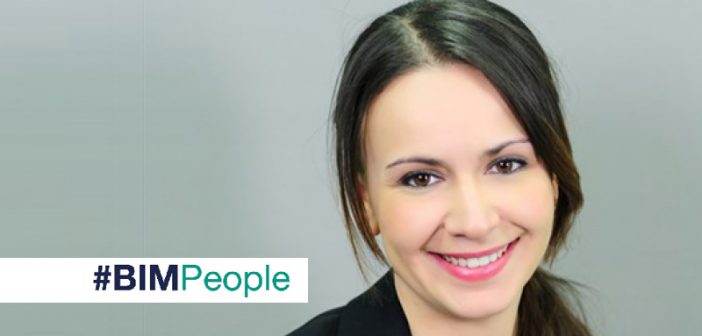Rebecca founded Digital Node, a digital design consultancy, in February 2014 with the aim of providing a service to construction industry professionals in BIM, advanced digital workflow and project technical support.
Prior to this, she worked for a variety of architectural firms in architecture and BIM roles. She has 15 years’ experience in the construction industry. Rebecca is an architect by profession and holds a Bachelor of Architecture degree from the University of South Australia.
Rebecca is the founder of Women in BIM (WiB), an organisation that aims to draw together women in key strategic positions relating to technology and architecture and allow a portal for shared information and interaction. She is an original member of the Construction Industry Council’s BIM2050 Steering Group and a member of BuildingSMART UK.
BIMIreland.ie spoke to Rebecca about Digital Node and her work with the Women in BIM group, which recently went about setting up a global database.
Can you tell us about your work at Digital Node?
Digital Node is a digital design consultancy. We offer strategic, management, and technical support and knowledge as well as training. Allied to project delivery experience, Digital Node aid their clients in the planning and implementation of specific BIM goals. This is achieved via our advanced knowledge in multidisciplinary briefing, design, construction and BIM and the company’s intention is to help clients understand the potential of using a BIM process regardless of company, project size or structure. We also support industry in education at all levels, from working with secondary schools through to universities as well as within industry.
What services does the company offer?
Digital Node’s offering is in three streams: strategic, management, and technical advice in regard to BIM and digital construction techniques. More recently we have been working in the ‘strategy’ space to offer clients the support and services required to successfully implement BIM within their organisations. We currently have clients globally from Australia, the UK and Canada.
Can you tell us about your clients and the major projects you have worked on?
Digital Node have worked with a variety of clients and projects. Our expertise lies in the process of developing BIM knowledge within an organisation so our clients vary from building owners, to training organisations to institutions. We have developed the BSI (British Standards Institution) BIM training courses and have worked with universities all over the world to support BIM in the curriculum.
We have also worked with a variety of small, medium and large organisations both in the strategic implementation and technical delivery of BIM related activities.
Please describe your observations of companies adopting BIM?
There is a confusion globally regarding BIM and the methodologies and understanding. The industry is currently struggling to understand the differences in these terminologies so implementation methods are varied and not consistent.
The industry has gradually been able to upskill, yet there are still many organisations who require support and understanding of how BIM applies to their business, rather than to the entire industry.
What advice would you give to a company considering BIM adoption?
To step up or step out! The industry is in the midst of rapid change and those companies not willing to adopt new processes will fall behind and become irrelevant. The process is simply an evolution of how we have worked and should be addressed today. Unfortunately, there are many companies still asking the question.
Can you tell us about your work as a BIM2050 Steering Group member?
As a steering group member for the BIM2050 team, my work stream involved education and training. I have a keen interest in how we can begin to train young people and create opportunities for all in BIM related roles and my main work was ensuring I understood the current state, and began to influence by promoting BIM through secondary schools and universities. Ultimately the aim of the group was to forecast future processes and thinking, in line with the ambitions of the government in the UK, which is what we have achieved.
Please tell us about Women in BIM and why and how you founded it?
The group was founded in 2012 as a result of attending events, being involved in projects, and promotion I had noticed a huge underrepresentation of women in these roles. The intention was to provide a networking platform via social media to connect to women in these roles and understand their challenges, strengths and thoughts about why few women were choosing these types of careers.
I also have a strong passion for creating role models of Women in BIM as I believe young people require these in order to grow and achieve their goals. Diversity is a huge issue in construction, Women in BIM is only one part of this.
What work does the Women in BIM organisation do?
We support and mentor. We encourage and promote. We aim to attract and retain.
The intentions of the group are simple. The project we are now working on aims to grow a database globally regarding Women in BIM related roles. The database will be used to create Hubs of Support for women to network, discuss and share ideas in the context of BIM around the globe.
We also wish to gather data and create a series of infographics illustrating our reach globally. This will ultimately inform industry as to where Women in BIM can grow and support within each region.
The database also gives women the opportunity to share their experience and offer their services as speakers and experts. We also hope to share the database with event organisers around the world to promote and encourage a more diverse speaker presence amongst the AEC industry.
What is your advice for women working in BIM?
Keep at it! BIM is an ever-evolving space. Too many women are either leaving the industry or not returning to work, and we need to represent women in leadership. This is one of the main reasons the group was created, to ensure that women can be in a position to sit amongst boards and act as leaders in the built environment. The skills shortages that we are facing must be addressed, and ensuring women remain in the built environment is one sure way to do this!
As an architecture graduate, how do you think BIM will change architecture?
I have been working in architecture for over 15 years, and my experiences have always encouraged that technology and its associated processes will support creative art and design. BIM should not, and will not change architecture. As an architect, to adopt BIM requires some upfront investment, but doing so and using BIM processes to enable the design and construction processes should only support the industry moving forward.
You can follow Rebecca on Twitter @becdecicco
Follow Digital Node and Women in BIM on Twitter: @Digital_Node @WomeninBIM
The contents of this site are subject to copyright laws and may not be reproduced in any form without the prior consent of the publishers. The views expressed in articles do not necessarily represent those of the publishers.




